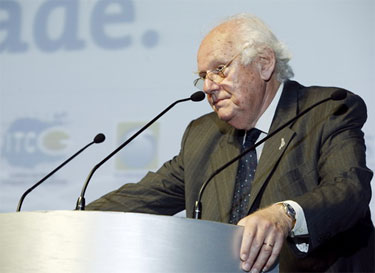Jurriaan Maessen
Infowars.com
September 30, 2010
“The governments of Europe, the United States, and Japan are unlikely to negotiate a social-democratic pattern of globalization – unless their hands are forced by a popular movement or a catastrophe, such as another Great Depression or ecological disaster”
Richard Sandbrook, Closing the Circle: Democratization and Development in Africa, Zed Books limited, London, 2000.
 | |
|
|
| |
| Self-described ‘ecosocioeconomist’ professor Ignacy Sachs. |
| |
A 1991 policy paper prepared for the United Nations Conference on Environment and Development (UNCED) by self-described ‘ecosocioeconomist’ professor
Ignacy Sachs outlines a strategy for the transfer of wealth in name of the environment to be implemented in the course of 35 to 40 years. As it turns out, it is a visionary paper describing phase by phase the road to world dictatorship. As the professor states in the paper:
“To be meaningful, the strategies should cover the time-span of several decades. Thirty-five to forty years seems a good compromise between the need to give enough time to the postulated transformations and the uncertainties brought about by the lengthening of the time-span.”
In his paper “
The Next 40 Years: Transition Strategies to the Virtuous Green Path: North/South/East/Global”, Sachs accurately describes not only the intended time-span to bring about a global society, but also what steps should be taken to ensure “population stabilization”:
“In order to stabilize the populations of the South by means other than wars or epidemics, mere campaigning for birth control and distributing of contraceptives has proved fairly inefficient.”
In the first part of the (in retrospect) bizarrely accurate description of the years to come, Sachs points out redistribution of wealth is the only viable path towards population stabilization and- as he calls it- a “virtuous green world”. The professor:
“The way out from the double bind of poverty and environmental disruption calls for a fairly long period of more economic growth to sustain the transition strategies towards the virtuous green path of what has been called in Stockholm ecodevelopement and has since changed its name in Anglo-Saxon countries to sustainable development.”
“(…) a fair degree of agreement seems to exist, therefore, about the ideal development path to be followed so long as we do not manage to stabilize the world population and, at the same time, sharply reduce the inequalities prevailing today.”
“The bolder the steps taken in the near future”, Sachs asserts, “the shorter will be the time span that separates us from a steady state. Radical solutions must address to the roots of the problem and not to its symptoms. Theoretically, the transition could be made shorter by measures of redistribution of assets and income.”
Sachs points to the political difficulties of such proposals being implemented (because free humanity tends to distrust any national government let alone transnational government to redistribute its well-earned wealth). He therefore proposes these measures to be implemented gradually, following a meticulously planned strategy:
“The pragmatic prospect is one of transition extending itself over several decades.”
In the second sub-chapter “The Five Dimensions of Ecodevelopment”, professor Sachs sums up the main dimensions of this carefully outlined move to make Agenda 21 a very real future prospect. The first dimension he touches upon is “
Social Sustainability”:
“The aim is to build a civilization of being within greater equity in asset and income distribution, so as to improve substantially the entitlements of the broad masses of population and of reduce the gap in standards of living between the have and the have nots.”
This of course means, reducing the standards of living in “The North” (U.S., Europe) and upgrading those of the developing nations (“The South and The East”). This would have to be realized through what Sachs calls “
Economic Sustainability”:
“made possible by a more efficient allocation and management of resources and a steady flow of public and private investment.”
The third dimension described by the professor is “
Ecological Sustainability” which, among other things, limits “the consumption of fossile fuels and other easily depletable or environmentally harmful products, substituting them by renewable and/or plentiful and environmentally friendly resources, reducing the volume of pollutants by means of energy and resource conservation and recycling and, last but not least, promoting self-constraint in material consumption on part of the rich countries and of the privileged social strata all over the world;”
In order to make this happen Sachs stresses the need of “defining the rules for adequate environmental protection, designing the institutional machinery and choosing the mix of economic, legal and administrative instruments necessary for the implementation of environmental policies.”
“directed at achieving a more balanced rural-urban configuration and a better territorial distribution of human settlements and economic activities (…)”.
The fifth and last dimension described in the UN policy paper is “
Cultural Sustainability”:
“looking for the endogenous roots of the modernization processes, seeking change within cultural continuity, translating the normative concept of ecodevelopment into a plurality of local, ecosystem-specific, culture-specific and site-specific solutions.”
But to realize such a dramatic new direction for the world, Sachs once again stresses the importance of incremental implementation. A matter of boiling the frog slowly as opposed to throwing the poor animal into a boiling-hot cooking pan:
“Even if we know where we want to get, the operational question is how do we proceed to put humankind on the virtuous path of genuine development, socially responsible and in harmony with nature. It is submitted that UNCED 92 should give considerable attention to the formulation of transition strategies that could become the central piece of the Agenda 21.”
This is the word- Agenda 21: the UN strategy for redistributing the wealth accumulated by the “North” in order to create a completely “balanced” world society- under auspices of the United Nations of course and the private central banks controlling it. This can only come about by destroying the middle-class. A sudden redistribution and industrialization would not do- for the middle-class would undoubtedly rise in defiance against it. Therefore, Sachs argues for an incremental and carefully planned dissolution of the middle-class phase by phase:
“To be meaningful, the strategies should cover the time-span of several decades. Thirty-five to forty years seems a good compromise between the need to give enough time to the postulated transformations and the uncertainties brought about by the lengthening of the time-span. The retooling of industries, even in periods of rapid growth, requires ten to twenty years. The restructuration and the expansion of the infrastructures requires several decades and this is a crucially important sector from the point of view of environment.”
Then Sachs plunges into his most shocking statement:
“However, the single most important reason to consider the transition strategies over a minimum of thirty-five to forty years stems from the non-linearity of these strategies; they should be devised as a succession of changing priorities over time. A good illustration is provided by the population transition. In order to stabilize the populations of the South by means other than wars or epidemics, mere campaigning for birth control and distributing of contraceptives has proved fairly inefficient.”
Sachs argues that “an accelerated programme of social and economic development of the rural areas should be the outmost priority in the first phase of a realistic population stabilization scheme.”
Who or what is to coordinate all this, according to Sachs, and how exactly is the UN to take control?
“The solutions”, says Sachs, “can vary in terms of their boldness and take the form of global, multilateral or bilateral arrangements.” These arrangements should as far as Sachs is concerned ensure “at least partially the automacity of financial transfers by some form of fiscal mechanisms, be it a small income tax or an array of indirect taxes on goods and services whose production and consumption has significant environmental impacts.”
Over time, gradually, these taxes should increase:
“Starting the operation with a one per ten thousand tax and increasing it so as to reach one per thousand in ten to twenty years seems a fairly realistic proposal, the more so that the scheme creates an interesting market for the private enterprises involved in R and D.”
Reading all this, the question as to what entity should take charge is not difficult to answer. Sachs:
“In order to generate maximum synergies between the national strategies and global action, the United Nations should create a forum for the periodical discussion and evaluation of these strategies and a research, monitoring and flexible planning facility to put them in a global perspective.(…). The forum should have a fair representation of all the main actors involved: governments, parliaments, citizen movements and the business world. Given its importance, it should be lifted from specialized agencies to a central place in the UN system.”
The “fair representation” Sachs is talking about is of course only a pretext to get everybody on board. As the “Danish Text”, drafted for the Copenhagen conference in late 2009, clearly illustrates, the IMF and World Bank will always have final say in the construction of any international system.








